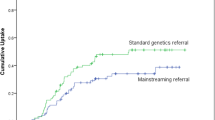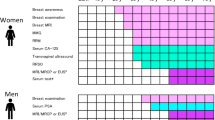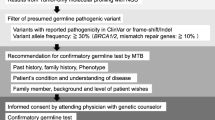Abstract
In 2021, Japan’s national health insurance made germline BRCA (g.BRCA) testing available to unresectable pancreatic cancer (PC) patients as a companion diagnostic (CD) of the PARP inhibitor. This study investigated the incidence of the g.BRCA variant (g.BRCAv.) and the status of the genetic medicine associated with its testing. A total of 110 PC patients underwent the testing, five of whom (4.5%) had a deleterious g.BRCA2v. (all truncations) but no g.BRCA1v. The turnaround time (TAT) to the doctors was 13 days, and to the patients, 17 days. A higher incidence of a BRCA-related family history and a shorter TAT were seen in the g.BRCAv. patients, but they were insignificant (p = 0.085 and p = 0.059, respectively). Genetic counseling was not performed for three g.BRCA2v. patients because two of them had no accessible relatives and one died of the cancer before the genetic report was completed. Two families underwent generic counseling and testing based on the patient’s genetic data. g.BRCAv. is recognized in a small fraction of PC cases, and the following genetic counseling is done more for the relatives than for the patients. TAT was constant and did not affect much on the genetic counseling, but the earlier testing is expected for patients with a deadly cancer.
This is a preview of subscription content, access via your institution
Access options
Subscribe to this journal
Receive 12 print issues and online access
$259.00 per year
only $21.58 per issue
Buy this article
- Purchase on Springer Link
- Instant access to full article PDF
Prices may be subject to local taxes which are calculated during checkout

Similar content being viewed by others
References
Miki Y. [Cellular functions of BRCA genes - from basic science to therapeutics]. Gan Kagaku Ryoho. 2012;39:498–501.
Casolino R, Paiella S, Azzolina D, Beer PA, Corbo V, Lorenzoni G, et al. Homologous recombination deficiency in pancreatic cancer: a systematic review and prevalence meta-analysis. J Clin Oncol. 2021;39:2617–31.
Frank TS, Deffenbaugh AM, Reid JE, Hulicket M, Ward BE, Lingenfelter B, et al. Clinical characteristics of individuals with germline mutations in BRCA1 and BRCA2: analysis of 10,000 individuals. J Clin Oncol. 2002;20:1480–90.
Fong PC, Boss DS, Yap TA, Tutt A, Wu P, Mergui-Roelvink M, et al. Inhibition of poly(ADP-ribose) polymerase in tumors from BRCA mutation carriers. N. Engl J Med. 2009;361:123–34.
Golan T, Hammel P, Reni M, Cutsem EV, Macarulla T, Hall MJ, et al. Maintenance Olaparib for Germline BRCA-Mutated Metastatic Pancreatic Cancer. N. Engl J Med. 2019;381:317–27.
Hirasawa A, Masuda K, Akahane T, Tsuruta T, Banno K, Makita K, et al. Experience of risk-reducing salpingo-oophorectomy for a BRCA1 mutation carrier and establishment of a system performing a preventive surgery for hereditary breast and ovarian cancer syndrome in Japan: our challenges for the future. Jpn J Clin Oncol. 2013;43:515–9.
Heemskerk-Gerritsen BA, Rookus MA, Aalfs CM. Ausems MGEM, Collee IM, Jansenet M, et al. Improved overall survival after contralateral risk-reducing mastectomy in BRCA1/2 mutation carriers with a history of unilateral breast cancer: a prospective analysis. Int J Cancer. 2015;136:668–77.
Japanese Organization of Hereditary Breast and Ovarian Cancer. Guidelines for Diagnosis and Treatment of Hereditary Breast and Ovarian Cancer 2021.
Daly MB, Pal T, Berry MP, Buys S, Dickson P, Domchek SM, et al. Genetic/familial high-risk assessment: breast, ovarian, and pancreatic, version 2.2021, NCCN clinical practice guidelines in oncology. J Natl Compr Canc Netw. 2021;19:77–102.
Pujol P, Barberis M, Beer P, Friedman E, Piulats JM, Capluongo ED, et al. Clinical practice guidelines for BRCA1 and BRCA2 genetic testing. Eur J Cancer. 2021;146:30–47.
Higashigawa S, Matsubayashi H, Kiyozumi Y, Kado N, Nishimura S, Oishi T, et al. Present status of germline findings in precision medicine for Japanese cancer patients: issues in the current system. Jpn J Clin Oncol. 2022;52:599–608.
Minamoto A, Yamada T, Shimada S, Kinoshita I, Aoki Y, Oda K, et al. Current status and issues related to secondary findings in the first public insurance covered tumor genomic profiling in Japan: multi-site questionnaire survey. J Hum Genet. 2022;67:557–63.
Matsubayashi H, Sasaki K, Ono S, Ishiwatari H, Ishikawa K, Satoh T, et al. Efficacy of endoscopic samplings during initial biliary drainage for cases of pancreatic head cancer: United diagnostic yields of multiple pathological samplings. Pancreatology. 2021;21:1548–54.
Japan Pancreas Society. Classification of Pancreatic Carcinoma. Fourth English Edition. Tokyo: Kanehara & Co., Ltd., 2017.
Pannala R, Basu A, Petersen GM, Chari ST. New-onset diabetes: a potential clue to the early diagnosis of pancreatic cancer. Lancet Oncol. 2009;10:88–95.
Baretta Z, Mocellin S, Goldin E, Olopade OI, Huo D. Effect of BRCA germline mutations on breast cancer prognosis: A systematic review and meta-analysis. Med (Baltim). 2016;95:e4975.
Nakamura Y, Taniguchi H, Ikeda M, Bando H, Kato K, Morizane C, et al. Clinical utility of circulating tumor DNA sequencing in advanced gastrointestinal cancer: SCRUM-Japan GI-SCREEN and GOZILA studies. Nat Med. 2020;26:1859–64.
Mizukami K, Iwasaki Y, Kawakami E, Hirata M, Kamatani Y, Matsuda K, et al. Genetic characterization of pancreatic cancer patients and prediction of carrier status of germline pathogenic variants in cancer-predisposing genes. EBioMedicine. 2020;60:103033.
Sahin I, Saat H. A novel BRCA1 duplication and new insights on the spectrum and frequency of germline large genomic rearrangements in BRCA1/BRCA2. Mol Biol Rep. 2021;48:5057–62.
Sluiter MD, van Rensburg EJ. Large genomic rearrangements of the BRCA1 and BRCA2 genes: review of the literature and report of a novel BRCA1 mutation. Breast Cancer Res Treat. 2011;125:325–49.
Judkins T, Rosenthal E, Arnell C, Burbidge LA, Geary W, Barrus T, et al. Clinical significance of large rearrangements in BRCA1 and BRCA2. Cancer. 2012;118:5210–6.
Kim SH, Hwang HK, Lee WJ, Kang CM. Biologic behavior of resected BRCA-mutated pancreatic cancer: Comparison with sporadic pancreatic cancer and other BRCA-related cancers. Pancreatology. 2021;21:544–9.
Liu Y, Ide Y, Inuzuka M, Tazawa S, Kanada Y, Matsunaga Y, et al. BRCA1/BRCA2 mutations in Japanese women with ductal carcinoma in situ. Mol Genet Genom Med. 2019;7:e493.
Yoshida R, Watanabe C, Yokoyama S, Inuzuka M, Yotsumoto J, Arai M, et al. Analysis of clinical characteristics of breast cancer patients with the Japanese founder mutation BRCA1 L63X. Oncotarget. 2019;10:3276–84.
Sekine M, Enomoto T, Arai M, Yokoyama S, Nomura H, Nishino K, et al. Correlation between the risk of ovarian cancer and BRCA recurrent pathogenic variants in Japan. J Hum Genet. 2022;67:267–72.
Cancer Statistics in Japan 2022. https://ganjoho.jp/public/qa_links/report/statistics/2022_en.html.
Arai M, Yokoyama S, Watanabe C, Yoshida R, Kita M, Okawa M, et al. Genetic and clinical characteristics in Japanese hereditary breast and ovarian cancer: first report after establishment of HBOC registration system in Japan. J Hum Genet. 2018;63:447–57.
Matsubayashi H, Takaori K, Morizane C, Maguchi H, Mizuma M, Takahashi H, et al. Familial pancreatic cancer: concept, management and issues. World J Gastroenterol. 2017;23:935–48.
Acknowledgements
We thank all of nurses and genetic coordinators in Shizuoka Cancer Center.
Author information
Authors and Affiliations
Corresponding author
Ethics declarations
Competing interests
The authors declare no competing interests
Ethical standards
Institutional Review Board of Shizuoka Cancer Center ethically approved this study (Institutional code no.: J2022-61).
Additional information
Publisher’s note Springer Nature remains neutral with regard to jurisdictional claims in published maps and institutional affiliations.
Supplementary information
Rights and permissions
Springer Nature or its licensor (e.g. a society or other partner) holds exclusive rights to this article under a publishing agreement with the author(s) or other rightsholder(s); author self-archiving of the accepted manuscript version of this article is solely governed by the terms of such publishing agreement and applicable law.
About this article
Cite this article
Matsubayashi, H., Todaka, A., Kawakami, T. et al. Genetic medicine in companion diagnostics of germline BRCA testing of Japanese pancreatic cancer patients. J Hum Genet 68, 81–86 (2023). https://doi.org/10.1038/s10038-022-01097-y
Received:
Revised:
Accepted:
Published:
Issue Date:
DOI: https://doi.org/10.1038/s10038-022-01097-y



